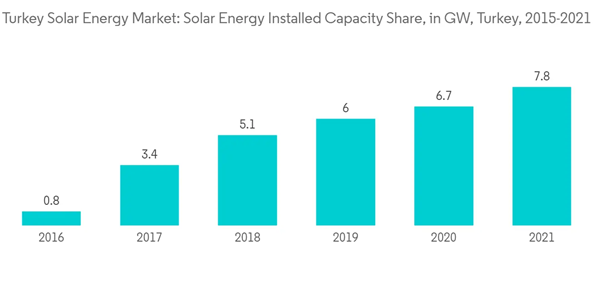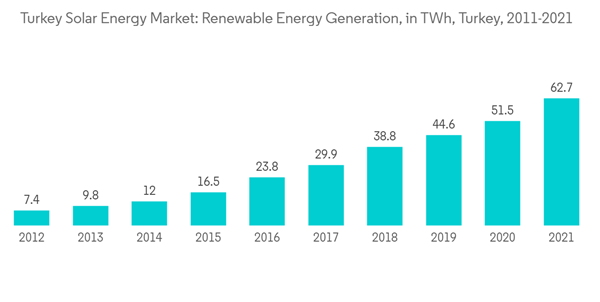COVID-19 negatively impacted the market in 2020. Presently the market is likely to reach pre-pandemic levels.
Key Highlights
- In the medium term, factors such as the decreasing reliance on fossil fuel-based power generation by the government and the declining cost of solar PV modules will likely drive the Turkey solar energy market.
- On the other hand, Turkey's dependence on hydropower due to mountainous terrain for electricity generation will act as a restraint for the market.
- Nevertheless, the efforts to strengthen energy security and ambitious goals to reduce greenhouse gas emissions by using renewable energy sources serve as an opportunity for the Turkey solar energy market.
Turkey Solar Energy Market Trends
Solar Photovoltaic (PV) Expected to Dominate the Market
- In 2022, Tosyalı Holding commenced constructing the world's largest rooftop solar project with an installed capacity of 140 MW on a 632-meter square area valued at USD 71 million. With the latest solar photovoltaic technology, the solar power plant is expected to have an annual production of 250 million kWh.
- Further, in 2022, according to Turkey’s energy market regulator, more than 300 companies had opted for installing solar PV systems due to a rise in electricity prices caused by the collapse of the currency and a spike in gas prices. The companies made approximately USD 100 million value of investment applications to install solar PV systems.
- Likewise, in 2022, the 27 MW Gaziantep Metropolitan Solar PV Park in Turkey, owned by Gaizentep Metropolitan Municipality, announced its construction. The project is expected to start commercial operation in 2024. Moreover, the Hasan Kalyoncu University of Turkey installed 1.2MW Solar Power Plant using Solar Photovoltaic Technology, which is expected to reduce substantial carbon emissions.
- As per the BP Statistical Review of World Energy 2022, the installed solar energy capacity in 2021 was 7.8 GW, registering a growth of 16% from the previous year. Turkey has witnessed an increasing trend in solar energy installed capacity due to the rise of solar PV projects such as solar PV parks, large-scale ground-mounted projects, and rooftop solar projects.
Supportive Government Policies and Programs Driving the Market Demand
- Turkey has excellent solar energy potential due to its geographic location, with a total annual solar irradiation time of 2,741 hours (7.5 hours per day). To tap this natural resource, the Turkish government has developed several policies and programs to increase its share of the renewable energy mix. In 2021, the renewable energy generation in Turkey was 62.7 TWh, an increase of 22% from the previous year. In recent years, the increased solar energy generation resulted in a rise in total renewable energy generation in the country.
- In 2023, the National Energy Plan announced by the government projected solar energy capacity to reach 2.9 gigawatts with an increase of approximately 500% by 2035, which is deemed to have the highest share in total installed generation capacity. The National Energy plan envisages achieving 100% clean electricity by 2035.
- In 2022, the Turkish government, at the COP27 climate summit, announced its strategy to reduce greenhouse gas emissions by 41 percent below business-as-usual levels by 2030 and achieve net-zero emissions by 2053. As electricity generation is primarily responsible for emitting the highest emissions, deploying clean energy technologies such as solar energy systems would be essential. Hence, the solar energy market would see an upsurge in the installations of projects.
- In October 2022, the Turkish government invested USD 409 million to set up a 2 GW vertically integrated solar module manufacturing facility in Izmir. The funding is received by Smart Solar Technologies to develop the project. As per the Eleventh Development Plan (2019-2023), the Turkish government plans to achieve 38.8% of renewables in power generation by 2023 and plans to commission 10 GW each of solar and wind capacity in the period 2017-27.
Turkey Solar Energy Market Competitor Analysis
The Turkish solar energy market is moderately consolidated. Some of the key players in this market include (in no particular order) Go Enerji, HT Solar Energy J.S.C, Halk Enerji Yatırımları Üretim İnşaat Taahhüt Ticaret ve Sanayi AS, Panasonic Corporation, and Asunim Group.Additional benefits of purchasing the report:
- The market estimate (ME) sheet in Excel format
- 3 months of analyst support
This product will be delivered within 2 business days.
Table of Contents
Companies Mentioned (Partial List)
A selection of companies mentioned in this report includes, but is not limited to:
- ANKARA SOLAR A.S.
- Go Enerji
- HT Solar Energy J.S.C
- Halk Enerji Yatırımları Üretim İnşaat Taahhüt Ticaret ve Sanayi AS
- Eko Renewable Energy Inc
- Asunim Group
- ATSCO Solar Panel Ltd.
- SMA Solar Technology AG










